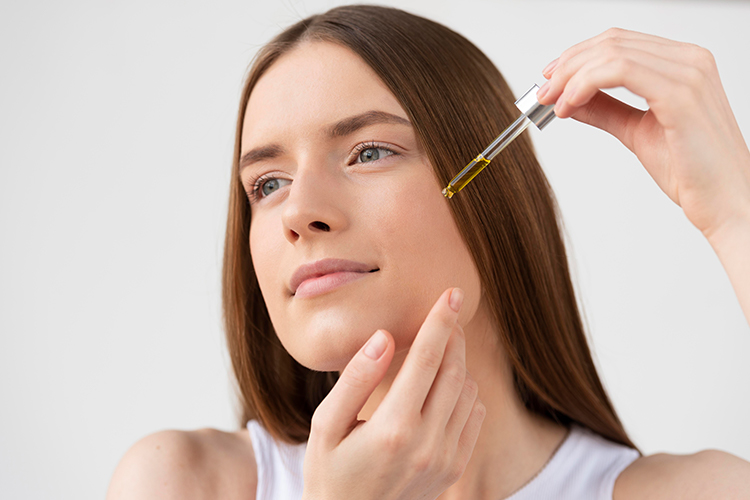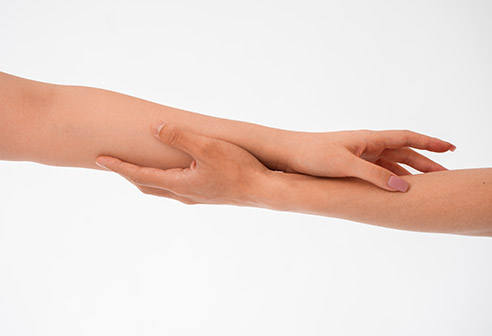
Squalane has become a favorite ingredient in skincare routines. Your medical aesthetic doctor, Dr. Lida Çiteli, has explained what you need to know about squalane, which makes your skin smooth, moist, and soft without feeling greasy.
What is Squalane?
Squalane is a type of oil that is light and has a moisturizing effect, working by mimicking your skin's natural sebum. This non-greasy and fast-absorbing skincare product is a good option even for sensitive skin. Squalane is a fat naturally found in animals, plants, and our skin. It's important to note that squalane, which plays a major role in keeping the skin soft and protected, is an unstable substance. Squalane, which can easily degrade when exposed to air, was therefore not suitable for use in skincare in the past.
However, thanks to the hydrogenation process, the shelf life of squalane has been extended. It is now possible for squalane not to oxidize and lose its effectiveness. While it was previously obtained from sources like shark liver oil, today, entirely plant-based squalane can be produced. Squalane, obtainable from sources such as rice bran, sugarcane, and olives, can now be easily used in skincare.
What Are the Main Benefits of Squalane for the Skin?
Deep Hydration Without Heaviness
Squalane's most important distinction is that, unlike other oils, it provides lasting hydration without leaving a greasy feeling. This oil, which is quickly absorbed by the skin, ensures that the skin retains its moisture throughout the day. This makes squalane an attractive option for both dry and combination skin types.
Mimics Natural Sebum and Strengthens the Skin Barrier
Because squalane resembles the body's own oils in terms of behavior, it is easily accepted and recognized by the skin. By strengthening the skin's moisture barrier, it prevents skin dryness and water loss. It is especially beneficial for damaged and dehydrated skin.
Non-Comedogenic, Meaning Safe for Acne-Prone and Oily Skin
Despite being a type of oil, it is non-comedogenic. This means that squalane will not clog pores. It moisturizes the skin without causing breakouts or shine. It is even a usable substance for acne-prone or oily skin.
Anti-Inflammatory – Soothing Irritation and Redness
Squalane is thought to help reduce irritation, inflammation, and redness. It is gentle enough for sensitive skin. It can have a soothing effect for people experiencing rosacea or eczema.
Fights Free Radicals and Antioxidant Effect
Its rich antioxidant content helps protect against environmental stress. Free radicals accelerate the signs of aging in the skin, such as dullness and fine lines. Protection from free radicals contributes to healthier and younger-looking skin.
Supports Collagen Production
Some studies suggest that squalane may support collagen production. This can lead to skin tightening over time. It results in smooth and elastic skin without irritation.
Safe for Sensitive and Eczematous Skin
Since squalane is non-irritating and an extremely gentle substance, it can be used even for sensitive and reactive skin types. It provides a moisturizing effect without harsh additives like alcohol or fragrance.
Squalane for Hair Care
Adds Moisture and Shine
Squalane is an effective moisturizer for dry and damaged hair. It does not make hair feel greasy. Instead, it allows moisture to be locked in and softness to be restored. With regular use, hair starts to look much shinier and healthier.
Helps Reduce Hair Breakage and Split Ends
Squalane coats the hair shaft, thus forming a protective layer. This reduces problems such as hair breakage and split ends. Fragile hair strands become stronger and gain elasticity. Frizz is more easily controlled. It is very beneficial for hair exposed to dye or heat.
How to Apply to Scalp or Hair Strands?
For the best possible results, take a few drops of squalane oil between your palms. Apply it directly to your hair, especially to dry areas. In addition, squalane is effective in soothing scalp dryness and dandruff problems; after applying it to your hair, you can rinse it out if you wish, or leave it in your hair.
How to Use Squalane in Your Skincare Routine?
Use Before Heavier Creams and After Serums
When using skincare products, the order should be from light to heavy. Squalane should be used after water-based serums but before thick moisturizing creams. This prevents its absorption from being hindered and allows moisture to be locked in.
Suitable for Both Day and Night
Squalane is light and suitable enough for you to use in the mornings. It also sits well under makeup. However, it does not provide protection against the sun's harmful rays. Therefore, it must be used with a broad-spectrum sunscreen.
Works Well with Retinol and Other Actives
Squalane can work compatibly with powerful active ingredients and can be used with components such as Vitamin C, retinol, and exfoliating acids.
Common Skin Problems Squalane Helps With
- Acne-Prone Skin
- Oily Skin
- Eczema and Dry Patches
- Psoriasis
- Dermatitis
- Rosacea



